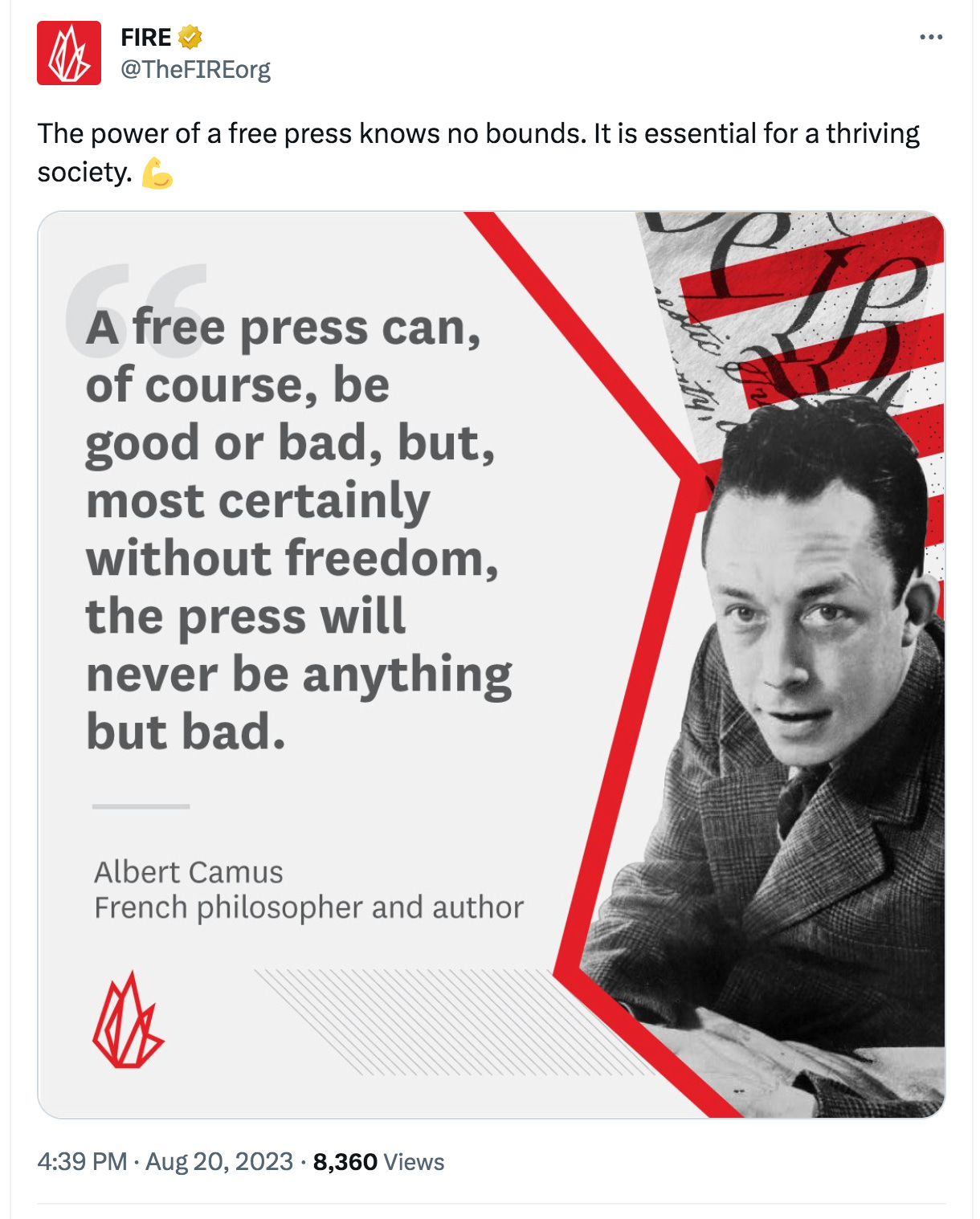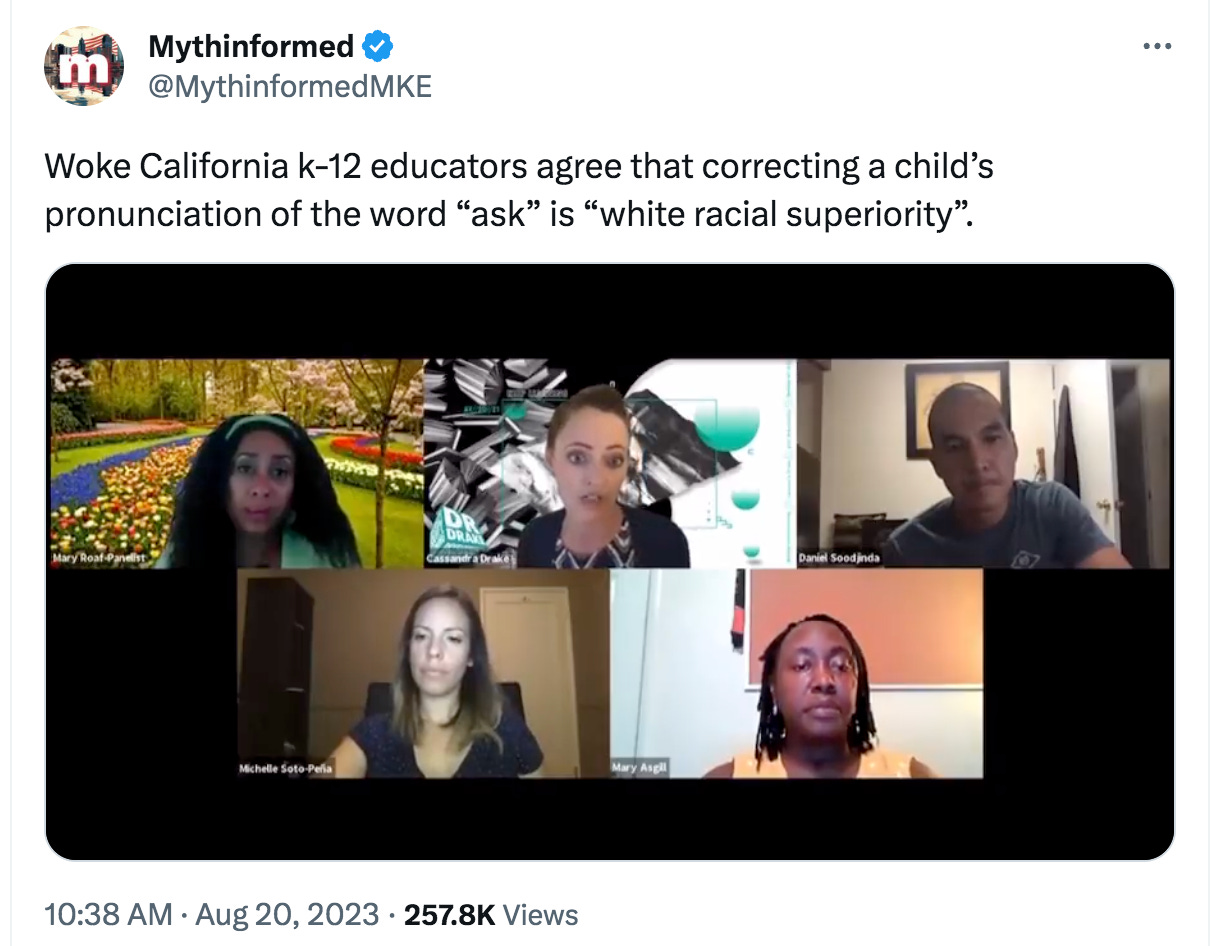E-Pluribus | August 21, 2023
California's unnatural math disaster; unintended consequences of undermining the Supreme Court; and studying "studies have shown."
A round-up of the latest and best writing and musings on the rise of illiberalism in the public discourse:
Faith Bottum: California’s Weapons of Math Destruction
While the headline alone is enough to merit attention, Faith Bottom at the Wall Street Journal clearly exposes California’s “framework” for teaching math to children as highly problematic. When teaching mathematics focuses on anything other than math, the results are bound to be underwhelming.
California’s education bureaucrats are seeking to reinvent math as a grievance study. “Big ideas are central to the learning of mathematics,” the framework insists, but the only big idea the document promotes is that unequal outcomes in math performance are proof of a racist society.
To achieve equal outcomes, the framework favors the elimination of “tracking,” by which it means the practice of identifying students with the potential to do well. This supposedly damages the mental health of low-achieving students. The problem is that some students simply are better at math than others. To close the gap, the authors of the new framework have decided essentially to eliminate calculus—and to hold talented students back.
[. . .]
Brian Conrad, a mathematics professor at Stanford, has created a website to debunk the framework. He writes that the California framework “selectively cites research to make points it wants to make,” and that it “contains false or misleading descriptions of many citations from the literature in neuroscience, acceleration, de-tracking, assessments, and more.” He gets so worked up that he calls a version of chapters 6 and 7 (which respectively cover kindergarten through fifth grade and sixth through eighth grades) an “embarrassment to professionalism.”
The jargon- and acronym-laden California framework, Mr. Conrad says, “promotes a cartoon view” of how students acquire “reliable mathematical skills.” It is equivalent, he says, to supporting that children need not “learn how to spell because there are spell-checkers and spelling is not part of analytical thinking.” The five-member writing team, supervised by a 20-member oversight team, didn’t collaborate with any recognized STEM experts in industry about what training graduates will need in the workplace, Mr. Conrad says.
Read it all here.
Ilya Somin: Drastic Liberal Schemes to Undermine the US Supreme Court Will Enable an Authoritarian Presidency
Ilya Somin is not by any stretch a fan, politically or ideologically, of a number of the recent decisions made by the high court. But, Somin warns at The Unpopulist, liberals are playing with fire by attacking the legitimacy of the court for political reasons and may get more than they bargain for should they succeed.
In almost all of these major Supreme Court cases with liberal outcomes, two or more conservative justices joined with the three liberals. Murphy v. NCAA actually featured all of the conservatives backing a result highly favorable to sanctuary cities, while two liberal justices dissented.
[. . .]
[E]ven in these situations involving weak right-wing legal arguments, it’s significant that the courts ruled against them. Politicians and activists routinely embrace terrible arguments for political advantage. Many GOP officials endorsed Trump’s bogus claim to have won the 2020 election. Conservative judges’ refusal to do likewise shows they are not just “politicians in robes.”
[. . .]
Conservatives advanced the plausible textual argument that “Legislature thereof” means the state legislature narrowly defined, thereby blocking judicial review by state courts. The Supreme Court held—correctly, in my view—that the text refers to legislative processes more broadly, which are subject to state constitutional constraints and review by the state courts. But had conservatives on the Supreme Court been looking for a plausible argument to advance partisan Republican interests, they could easily have done so. There were similarly plausible reasons to rule in favor of right-wing litigants in many other cases where the Court ultimately rejected their positions.
None of this proves that the Court is not conservative overall. The Court has obviously issued major conservative decisions expanding protection for gun rights and religious liberties, reversing precedent protecting a right to abortion, and limiting the powers of administrative agencies.
But like the Court’s more liberal rulings, these decisions had at least reasonably plausible justifications. For example, in the Second Amendment decision in NYSPA v. Bruen (2022), the Court struck down a New York law that gave state officials broad presumptive discretion to reject gun license applications. It would have been implausible to hold that a constitutional right can be so completely at the mercy of the very government whose power the right is supposed to limit.
Read the whole thing.
Alex Small: “Studies Have Shown” Is Not Enough
Start with a conclusion and chances are if you look hard enough, “studies have shown” you are right. Alex Small at Discourse Magazine examines the “trendy research” phenomenon and posits that without application, all the studies in the world don’t amount to much.
It is not unusual that expert advice and the responses thereto depend as much on subjective preferences as the state of the evidence. The experience of the COVID pandemic—and the government’s response to it—demonstrated how a recommendation that “you ought to do X” reflects the recommender’s values as much as their factual knowledge. Epidemiologists recommended lockdowns based on both empirical facts about disease severity and a value judgment that the dangers of illness outweighed the harms of social isolation. However, a person with the same empirical data might make the values-driven determination that precious time with loved ones is worth a risk. Many people made exactly that determination, and the political and ideological polarization in the public’s compliance (and noncompliance) illustrates that the question turned as much on values as data.
Still, values do not render facts irrelevant. Prerogatives and responsibilities go hand-in-hand. I might reasonably follow my personal preferences when the demonstrated benefits of a teaching method are minimal, but overcome reluctance when the proven benefits are significant. The key question is how a reasonable non-expert should evaluate contradictory evidence. It’s one thing to disregard the occasional conflicting study, but it’s another to shrug off large-scale analyses conducted by experts.
I propose resolving disputes in the social science literature in the same way that we solve so many other practical problems: Ignore the headlines, let experts focus on social science, and wait on social engineering. Yes, really.
Read it all.
Around Twitter
Axios, along with the Pulitzer Center and Danish newspaper Politiken, has conducted an investigation into China’s involvement in “education” in Africa, but with a sinister twist. Below is an excerpt from a thread based on the story:
Via the Foundation for Individual Rights and Expression, Albert Camus on the huge difference between freedom of the press and the press without freedom:
And finally, correcting pronunciation used to be called “teaching.” But no longer. (click for video)









